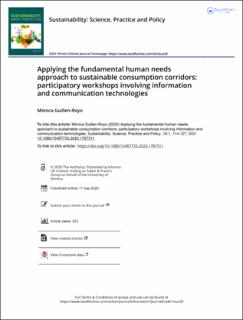| dc.contributor.author | Guillen-Royo, Monica | |
| dc.date.accessioned | 2021-02-10T14:12:09Z | |
| dc.date.available | 2021-02-10T14:12:09Z | |
| dc.date.created | 2020-09-21T11:13:35Z | |
| dc.date.issued | 2020 | |
| dc.identifier.citation | Guillen-Royo, M. (2020). Applying the fundamental human needs approach to sustainable consumption corridors: participatory workshops involving information and communication technologies. Sustainability: Science, Practice, & Policy, 16(1), 114-127. doi: | en_US |
| dc.identifier.issn | 1548-7733 | |
| dc.identifier.uri | https://hdl.handle.net/11250/2727249 | |
| dc.description.abstract | This article discusses economist Manfred Max-Neef’s approach to fundamental human needs (FHN) as a potential framework for the study of and action on sustainable consumption corridors. The FHN perspective distinguishes between human needs, which are universal; satisfiers, considered culturally and historically relative; and consumer goods, which change with fashions and across socio-economic groups. The conceptual framework is supplemented by a participatory methodology designed to identify the constellation of synergic satisfiers, which, by not being detrimental to any human need, are ontologically linked to environmental sustainability. The article situates the FHN framework within the sustainable consumption literature by discussing three paradigmatic dimensions (analytical versus normative, individualist versus systemic, and reformist versus revolutionary and reconfiguration) that connect to socio-technical and practice theoretical perspectives on consumption. The results of needs-based workshops at the University of Oslo are drawn on to illustrate the contribution of a FHN perspective. Using the case of information and communication technologies (ICTs), the study finds that if synergic satisfiers such as shorter working weeks, noncommercial meeting places, simplicity-focused lifestyles, and direct participation in local policy making are present in the society, ICTs can contribute to the fulfillment of human needs and environmental sustainability. The constellation of satisfiers that define such a condition supports the emergence of maximum and minimum standards in the use of ICTs. | en_US |
| dc.language.iso | eng | en_US |
| dc.publisher | Taylor & Francis | en_US |
| dc.relation.uri | https://www.tandfonline.com/doi/full/10.1080/15487733.2020.1787311 | |
| dc.rights | Navngivelse 4.0 Internasjonal | * |
| dc.rights.uri | http://creativecommons.org/licenses/by/4.0/deed.no | * |
| dc.title | Applying the fundamental human needs approach to sustainable consumption corridors : participatory workshops involving information and communication technologies | en_US |
| dc.type | Peer reviewed | en_US |
| dc.type | Journal article | en_US |
| dc.description.version | publishedVersion | en_US |
| dc.rights.holder | © 2020 The Author(s) | en_US |
| dc.subject.nsi | VDP::Samfunnsvitenskap: 200 | en_US |
| dc.source.pagenumber | 114-127 | en_US |
| dc.source.volume | 16 | en_US |
| dc.source.journal | Sustainability: Science, Practice, & Policy | en_US |
| dc.source.issue | 1 | en_US |
| dc.identifier.doi | 10.1080/15487733.2020.1787311 | |
| dc.identifier.cristin | 1831570 | |

